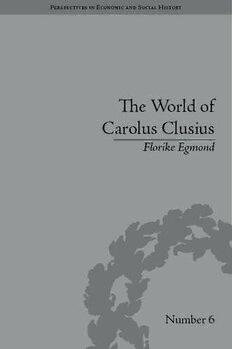
The World of Carolus Clusius: Natural History in the Making, 1550-1610 (Perspectives in Economic and Social History, 6) PDF
307 Pages·2010·3.787 MB·English
Most books are stored in the elastic cloud where traffic is expensive. For this reason, we have a limit on daily download.
Preview The World of Carolus Clusius: Natural History in the Making, 1550-1610 (Perspectives in Economic and Social History, 6)
Description:
This vibrant study explores the way in which European knowledge of the natural world was transformed during the late sixteenth and early seventeenth centuries. Based on a large collection of primary source material - mainly correspondence - Egmond investigates horticultural techniques, fashions in the collection of rare plants, botanical experimentation and methods of scientific evaluation, as well as tracking the exchange of knowledge. Central to this activity is the figure of Carolus Clusius (1526-1609), the first truly scientific botanist. The transformation of people's everyday experience with plants is shown through the practical manifestations of this newly found fervour: the growth of collecting, garden display and fascination with the rare and exotic.
See more
The list of books you might like
Most books are stored in the elastic cloud where traffic is expensive. For this reason, we have a limit on daily download.
